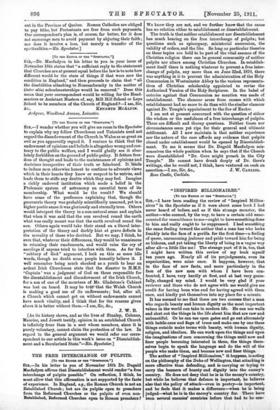THE FREE INTERCHANGE OF PULPITS.
[TO THE EDITOR OF THE " SPECTATOR."]
Sin,—In his letter to you of November 16th Dr. Dugald Macfadyen affirms that Disestablishment would render "a free interchange of pulpits possible." On reflection, I think, he must allow that this affirmation is not supported by the facts of experience. In England, e.g., the Roman Church is not an Established Church ; but are its pulpits open to preachers from the Reformed Churches or the pulpits of even non- Established, Reformed Churches open to Roman preachers ? We know they are not, and we further know that the cause has no relation either to establishment or disestablishment.
The truth is that neither establishment nor disestablishment has much bearing on the free interchange of pulpits; but questions such as episcopacy, ministerial succession, the validity of orders, and the like. So long as particular theories on these topics are held to be part of the vital essence of the Christian religion there can be general community of neither pulpits nor altars among Christian Churches. In establish- ment itself there is nothing whatever to prevent a free inter- change of pulpits, any more than on June 22nd, 1870, there was anything in it to prevent the administration of the Holy Communion in Westminster Abbey to the various representa- tives of Christian scholarship appointed to revise the Authorized Version of the Holy Scriptures. In the babel of outcries against that Communion no mention was made of establishment. The clamour arose from causes with which establishment had no more to do than with the similar clamour against Dr. Temple's appointment to the See of Exeter.
I am not at present concerned with the question of either the wisdom or the usefulness of a free interchange of pulpits. These are difficult and thorny questions. Neither times nor circumstances seem yet ripe for their general and ultimate settlement. All I now maintain is that neither experience nor the nature of the case affords any evidence that pulpits closed under establishment would be opened by Disestablish- ment. To me it seems that Dr. Dugald Macfadyen mis- conceives the whole position when he says that if the Church were disestablished "Dr. Gore might preach in the City Temple." He cannot have drunk deeply of Dr. Gore's writings, else he would not, I think, have ventured on such an


















































 Previous page
Previous page